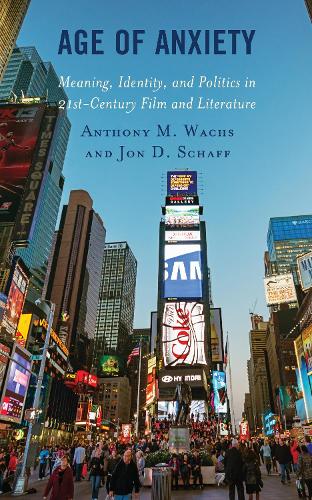
Age of Anxiety: Meaning, Identity, and Politics in 21st-Century Film and Literature
(Hardback)
Available Formats
Publishing Details
Age of Anxiety: Meaning, Identity, and Politics in 21st-Century Film and Literature
By (Author) Anthony M. Wachs
By (author) Jon D. Schaff
Bloomsbury Publishing PLC
Lexington Books
29th November 2019
United States
Classifications
Professional and Scholarly
Non Fiction
Film history, theory or criticism
Literary studies: c 1900 to c 2000
791.43655
Physical Properties
Hardback
268
Width 160mm, Height 232mm, Spine 26mm
585g
Description
Age of Anxiety: Meaning, Identity, and Politics in 21st Century Film and Literature analyzes literature and films that speak to our age of anxiety resulting from the decline of narratives that provided individuals with a meaningful human life. The authors argue that the twentieth-century sought to free individuals from the constraints of authoritative cultural traditions and institutions, liberating the autonomous self. Yet this has given rise to anxiety rather than liberation. Instead of deriving ones sense of purpose from ones role and place within a community, the consumer has been deceived into thinking that their identity can be purchased through the meaning represented by the conspicuous consumption of a brand. The same phenomenon manifests itself in politics within recent populist revolts against globalist politics. In addition, the rapid pace of technological development is driving an unprecedented faith in the malleability of human beings, raises doubts as to what it means to be a person. Utilizing paradigms from the fields of Communication/Rhetoric and Political Philosophy the book shows how the self has been displaced from its natural habitat of the local community. The book traces the origins of modern anxiety as well as possible remedies. Considered in the book are such popular culture artifacts as Downton Abbey, WALL-E, Hacksaw Ridge, Westworld, and Lord of the Rings and zombie films.
Reviews
The worst one can say about a book of ideas is that it elicits neither strong agreement nor passionate dissent. Fortunately, Age of Anxiety: Meaning, Identity, and Politics in 21 -Century Film and Literature by Professors Anthony M. Wachs and Jon D. Schaff has the distinction of having stimulated both in this reader. . . I considered it an engaging and provocative text, which offers both an impassioned defense of (and encouragement towards) traditional Western values as well as [a] dismissal of other possibilities for cultural evolution and personal growth. As such, the book should prove a potent and illuminating guide to living for some. . . . Reading it was a soothing reminder of simpler, more socially stable and civilized times as well as an anxiety provoking challenge to some of my own convictions. In this way, it was a challenging read; but I appreciated that. Sometimes we need a shakeup to our convictions to test them, to see if they're still 'worth fighting for' or not - and this book got me willing to speak up for and defend some of what I hold to be morally important.
-- "VoegelinView"Author Bio
Anthony M. Wachs is assistant professor of rhetoric, communication ethics & the Catholic intellectual tradition at Duquesne University. Jon D. Schaff is professor of political science at Northern State University.
